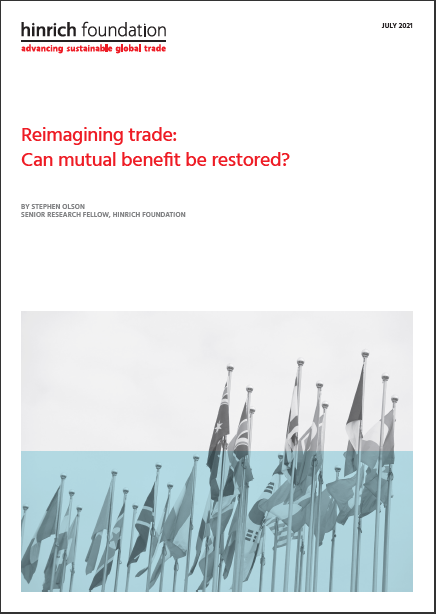Sustainable trade
Reimagining trade: Can mutual benefit be restored?

Published 27 July 2021
Economic coercion and protectionism may be increasingly prominent in global trade for its delivery of short-term gains. Trust and confidence between nations may have been damaged beyond repair. But we must reflect carefully before resigning ourselves to a more Hobbesian trade world.
It is not an exaggeration to say that trade has transformed the world, especially during the latter half of the 20th century. While trade has not been an idyllic panacea, no other single factor has driven greater gains in global economic development and rising standards of living.
Today, the trade landscape looks like a battlefield. Protectionist policies are on the rise. Global trade governance has been derailed. The two largest economies in the world remain locked in the most significant trade war in 90 years, while smaller trade spats are breaking out across the globe. We are approaching an inflection point. If we hope to continue to derive transformative benefit in the decades to come, trade relationships will need to be reimagined.
In this essay, Hinrich Foundation Senior Research Fellow Stephen Olson notes that hardheaded pragmatism should point us towards a greater emphasis on broad based mutual benefit in our trade relationships. It would be counterproductive to have idealized expectations about a “Kumbaya moment”, but resorting to protectionism and the 'blame game' will do little to secure a sustainable future for workers, consumers, companies, and economies.
Download Reimagining trade: Can mutual benefit be restored? by Stephen Olson:

© The Hinrich Foundation. See our website Terms and conditions for our copyright and reprint policy. All statements of fact and the views, conclusions and recommendations expressed in this publication are the sole responsibility of the author(s).
From 2014 to January 2024, Mr. Olson was a Senior Research Fellow of the Hinrich Foundation. Mr. Olson began his career in Washington DC as an international trade negotiator and served on the US negotiating team for the NAFTA negotiations.
Have any feedback on this article?
Related articles

Trade imbalances are an existential threat to the global trading system
17 September 2019

Rethinking China trade policy: Lessons learned and options ahead
09 February 2021

Trade imbalances are an existential threat to the global trading system
17 September 2019

Rethinking China trade policy: Lessons learned and options ahead
09 February 2021

Trade imbalances are an existential threat to the global trading system
17 September 2019

Rethinking China trade policy: Lessons learned and options ahead
09 February 2021


